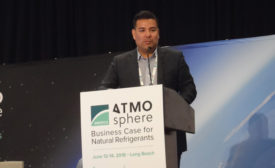Refrigeration
Does Peak HVAC Pricing Result in Piqued Customers?
Experts debate raising prices during busy times
Read More
Seven Telltale Signs of a System Overcharged with Refrigerant
System checks result in faster troubleshooting
Read More
The Case of Natural Refrigerants Versus the ‘Super Pollutants’
Conference highlights options available for commercial refrigeration
Read More
Copyright ©2024. All Rights Reserved BNP Media.
Design, CMS, Hosting & Web Development :: ePublishing










